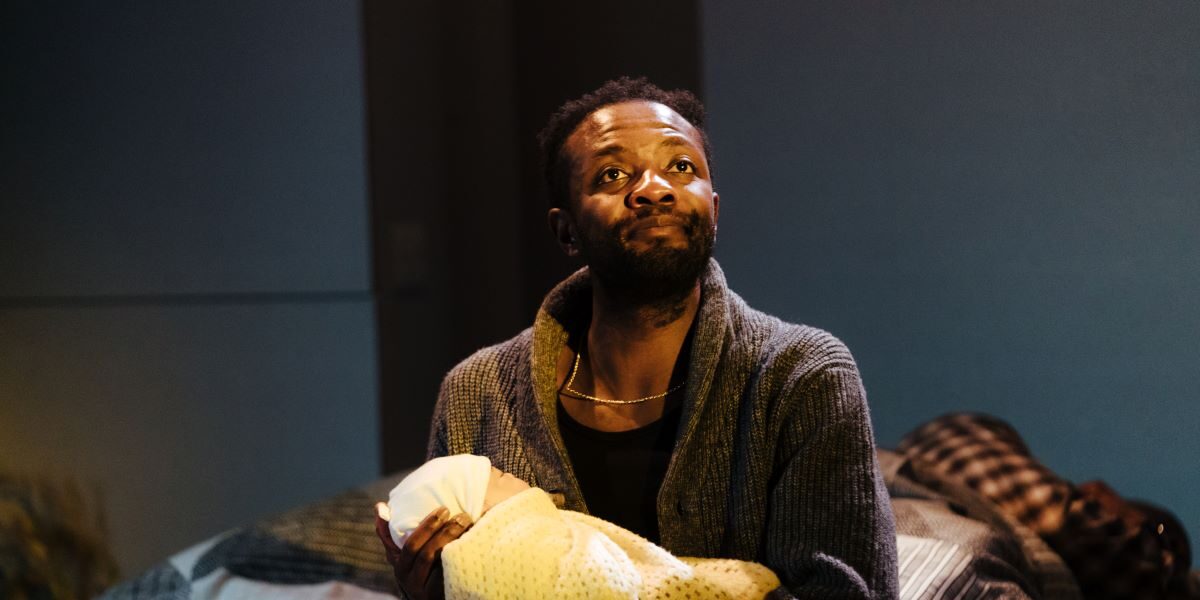At the outset this play seems to be a didactic tract for the times – Pip, played by author Coral Wylie, is busy correcting her parents’ language around her non-binary and bisexual identities. Inter-generational gender wars seem to be the main subject until other richer and unfamiliar themes open up in an arresting fashion. Discovery of three jackets, in fashions of the 1990s, suddenly reverses time’s arrow and we are taken back into the youth of Pip’s parents when they were very different people. Layers of complexity emerge teased out through the pages of a diary found in the pocket of one of the jackets, which belonged to Duncan, best friend to both Craig and Lorin, whose death changed everything.
The play truly bursts into life with the emergence in enacted flahback of Omari Douglas, playing Duncan. This is a glowingly detailed and rounded performance, full-on in its embrace of all life has to offer and flecked with wry, exuberant humour. The other performances come to life too, as Wil Johnson and Pooky Quesnel shape shift between their care-free spontaneous younger selves and the pinched, cautious and defensive people they have become in later life. The opening up of perspectives into these relationships also lends compelling meaning an purpose to the themes of diversity, identity and environmental responsibility that otherwise would appear more arbitary and political than truly dramatically experienced. There are some very big themes here which receive sensitive and insightful treatment – how far one generation can ever understand or presume to judge another? The extent to which every generation has to grapple with the mysteries of sexuality and complexities of relationships as best it can….
The creative team contribute many facets to these positives. The set by Max Johns turns out to contain multitudes: what appears to be a simply furnished elongated kitchen and living area holds many revelations, from beds to flower beds, culminating in a glorious final sequence in which botanical designer Dan Yeo dresses every surface with lush foliage in fulfilment of Duncan’s dreams. It banishes all memory of the sterile concrete overcoat that Craig imposed to bury his grief. There is a more-or-less continuous, subtle and evocative soundtrack conveying hints of the music of the 1990s and today with gentle mood underscores; while the lighting is unobtrusively inventive too until the lavish final sequence.
However the play has a couple of problems that do serve to undermine its overall impact. At two and a half hours (with interval) the evening is far too long and the first half in particular could lose at least twenty minutes of material to advantage – there is simply too much exposition of similar material. You feel the contrast sharply in the much more incisive and fluid second half. Also the decision to stage the play in traverse, essential maybe for the elaborate set design, has the consequence that dialogue is lost to one side or the other of the audience unless the actors are very careful – only Douglas negotiates this peril successfully.
That said, this is an impressive, if imperfect, debut by Wylie which handles important and demanding themes with skill, humour and compelling emotional authenticity.
Writer: Coral Wylie
Director: Debbie Hannan
Cast: Omari Douglas, Wil Johnson, Pooky Quesnel, Coral Wylie
Photo Credit: Helen Murray
Until: 22 March 2025
2 hrs 30 mins with interval

